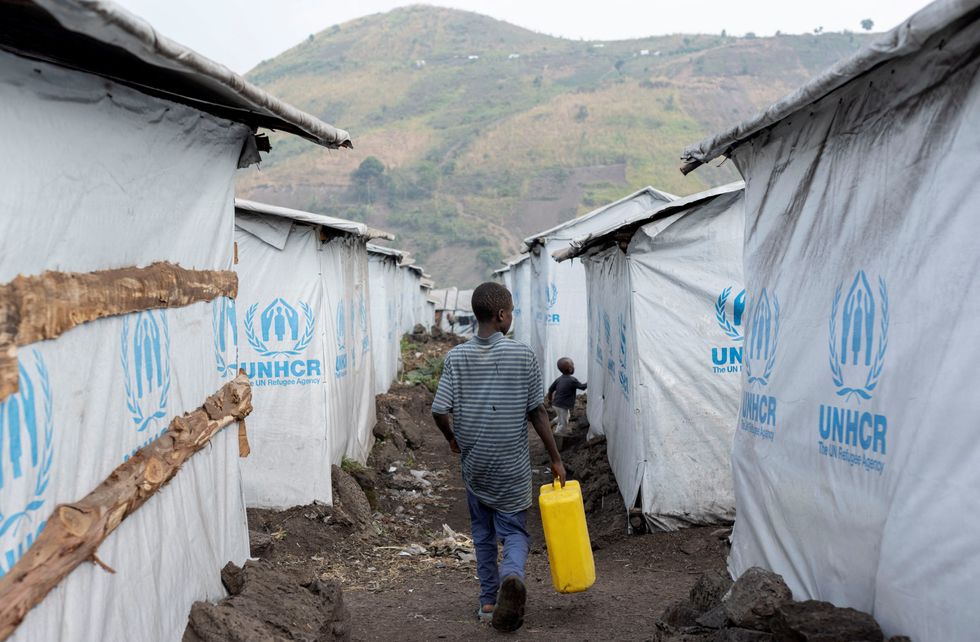The first case of a potentially deadly new strain of the mpox virus known as Clade 1b has been detected in Britain.
The affected person developed flu-like symptoms more than 24 hours later and on October 24 began to develop a rash, which worsened in the following days.
The person went to the emergency room in London on October 27, where they were swabbed, tested and sent home to isolate while awaiting the results.
They have now been transferred to the high-risk infectious diseases unit at the Royal Free Hospital for treatment.

Clade 1b takes over parts of central and west Africa. It also extends beyond the continent
Reuters
Mpox is a viral disease that causes fluid-filled skin lesions, fever, and, in severe cases, death. It is spread through close contact with an infected person’s skin, sores, scabs, bodily fluids, or respiratory droplets.
Fewer than ten people believed to have been in contact with the patient were initially sought, the UKHSA said.
These are household contacts, although the UKHSA is “still working” on how many people it may need to contact.
Commenting on the confirmation of the first confirmed case of Clade 1b in England, Cllr David Fothergill, Chair of the Local Government Association’s Community Wellbeing Board, said: “Local public health teams are working closely with the UK Safety Agency. sanitary. Surveillance, contact tracing, accurate information from trusted sources, vaccines, treatments and support are essential to stopping the spread.
“As the virus spreads through close contact, we urge everyone to be aware of any unusual rashes or lesions and to contact NHS 111 or their local sexual health service if in doubt. »
This development does not surprise Professor Jonathan Ball, Deputy Director of the Liverpool School of Tropical Medicine and Professor of Molecular Virology at the Liverpool School of Tropical Medicine,
He said: “It’s not unexpected. There are active human-to-human transmission chains of Clade 1b monkeypox infections in several countries in sub-Saharan Africa, and therefore people coming into close contact with an infected person are at risk.
“The WHO previously announced the Mpox outbreak as a public health emergency of international concern, in recognition of its potential for continued and potentially accelerated spread if the global community does not come together in a concerted effort to eradicate the disease. current epidemic. This trend was confirmed more recently by yesterday’s announcement of the activation of the Global Health Emergency Corps to strengthen the response.
“The number of cases reported outside of Africa remains low, but the ability of the Clade 1b virus to spread through human-to-human transmission means this problem cannot be ignored. We are unlikely to see large outbreaks in countries with well-developed public health and surveillance systems, but it reminds us that we must do more to eliminate health inequities around the world.
Clade 1b – takes over parts of central and western Africa. It has infected more than 25,000 people and caused nearly 1,000 deaths since its detection in the Democratic Republic of Congo last year.
It has also spread beyond the continent.
Thailand confirmed its first suspected case of Clade 1b in August, following Sweden, Thailand, Pakistan and the Philippines.
In response to the current outbreak, the World Health Organization (WHO) and partners, in collaboration with Member States, activated the Global Health Emergency Corps (GHEC) for the first time.
The GHEC is a group of professionals aiming to strengthen the response to health emergencies and a collaboration platform for countries and health emergency networks.
It supports countries with health emergency personnel, rapid deployment of experts and networking of technical leaders.
The first activation of this new support mechanism follows the declaration of mpox as a public health emergency of international concern by the Director-General of the WHO, Doctor Tedros Adhanom Ghebreyesus, on August 14, 2024.
“WHO and partners are supporting the government of the Democratic Republic of the Congo and other countries to implement an integrated approach to case detection, contact tracing, targeted vaccination, clinical care and home, infection prevention and control, community engagement and mobilization, and specialized activities. logistical support,” said Dr Mike Ryan, Executive Director of the WHO Health Emergencies Program.
“The GHEC strengthens the capacity of many effective stakeholders at the national and regional levels to collaborate and ensure success on the ground to interrupt transmission and reduce suffering. »
Emergency measures are necessary.
Unlike Clade 2, which was restricted to men who have sex with men, Clade 1b is spread more widely through heterosexual contact, among pregnant women and children.
LATEST DEVELOPMENTS IN HEALTH

Sweden confirmed its first case of mpox on August 15, 2024
Getty
It also has a higher mortality rate than Clade 2, which started the outbreak in the UK in 2022.
Eighteen African countries have reported cases of mpox this year, and the rapid spread of mpox clade 1b to at least two other regions has raised concerns about further spread.
Doctor Eoghan De Barra, consultant in infectious diseases at Beaumont Hospital, will welcome the activation of the GHEC by the WHO in response to the epidemic.
He previously told GB News that the WHO should focus on the research and medical communities, and signal to governments that they should assess their planning and preparedness.
“We have the tools to limit the impact of mpox on human health, but we need resources, education and continued scientific research to optimize them,” said Dr. De Barra.